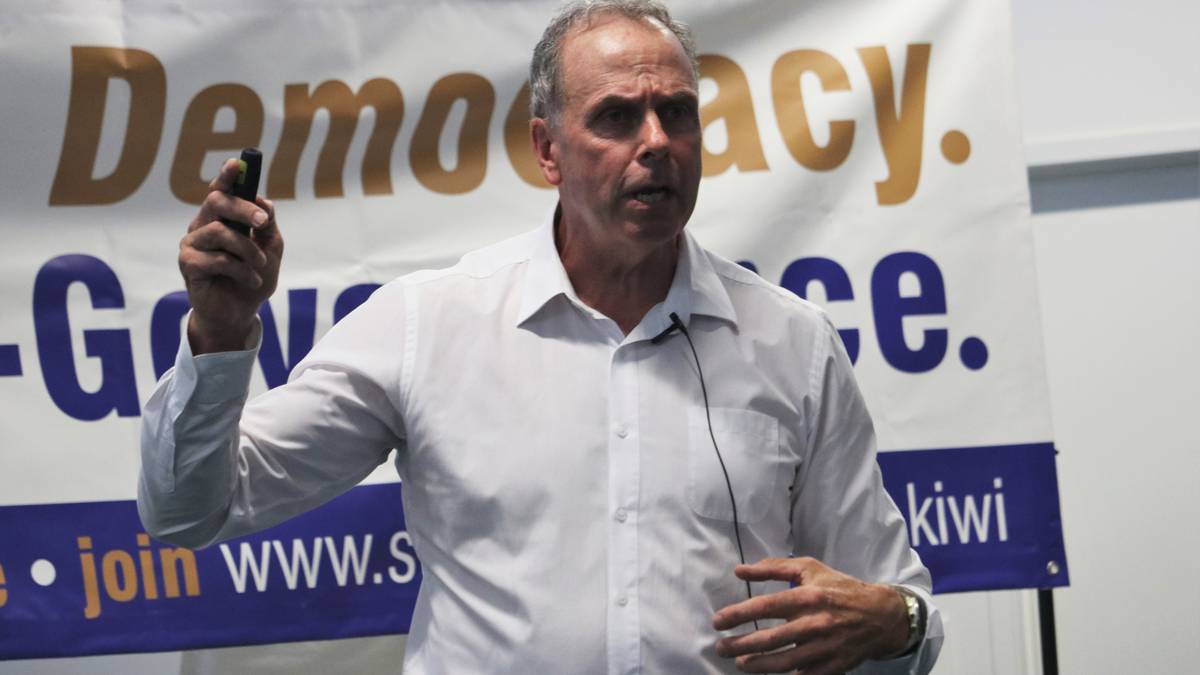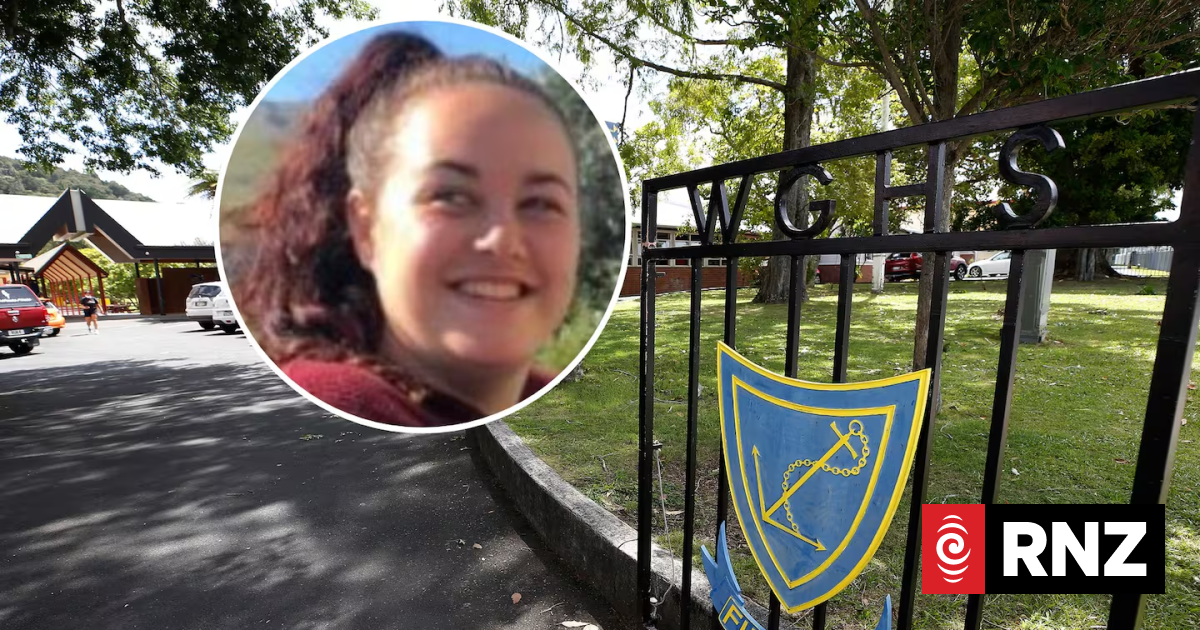How West Auckland residents are faring after terrifying shooting, how many of us want dental care to be free and warnings as 200 US banks at risk in the latest New Zealand Herald headlines. Video / NZ Herald
The organiser of a roadshow of anti-co-governance rallies across New Zealand is in a property dispute with Māori in his community and says his “disharmonious” relationship with locals was a “trigger” behind his campaigning.
Critics
have labelled Northland evangelist Julian Batchelor’s meetings as “racist” and others in the tiny Northland coastal community of Rawhiti claim his property development has seen an urupa (cemetery) “desecrated” and the destruction of a culturally significant pohutukawa.
Batchelor’s “stop co-governance” roadshow meeting in Dargaville a week ago, had three police keep the peace at a gathering of 150 people – half of who turned up to protest. Police were also on standby – but not present – for the meeting in Kerikeri earlier this month which also hosted about 150 people, about a quarter of whom attended to object to Batchelor’s views.
/cloudfront-ap-southeast-2.images.arcpublishing.com/nzme/AXSD2WAX6BHFJLNY66JUCMFNGI.jpg)
And a large police presence separated protesters from roadshow attendees at a meeting in the Ōrewa Community Centre on Saturday, where tensions erupted into confrontations between individual attendees and protesters, and shouting in response to statements made by Batchelor.
The roadshow continues with multiple meetings almost every week until Te Anau in July, although some venues on the route have cancelled bookings after discovering the nature and theme of Batchelor’s campaign.
Batchelor told the Herald: “It’s been my relationship with Māori at Rawhiti that has triggered my involvement in this movement.” He said there were ongoing disputes over the Rawhiti property, bought in 2008, including a demonstration at the property during which he claimed damage worth $10,000 was done.
/cloudfront-ap-southeast-2.images.arcpublishing.com/nzme/CRMVVGCRRFF2XJNMVAI5VMVZ3Q.jpg)
When asked if police had prosecuted the vandals, Batchelor said no action had taken place, with a possible reason being that “police are favouring Māori”. It’s a claim that contrasts with criminal justice statistics that show a strong skew against Māori from arrest to prosecution through to making up more than 50 per cent of the prison population.
Batchelor also raised the Rawhiti dispute at the Kerikeri meeting, saying he was upset to receive a letter from Heritage NZ last year saying his land included areas considered sacred to Māori.
Advertisement
From at least 2015, members of the Rawhiti community repeatedly lodged complaints with Far North District Council over the development of Batchelor’s property.
They included concerns over the impact the development was having on one of two historically significant urupa bordering the property and the removal of an old pohutukawa tree for a retaining wall.
Robert Willoughby of the Ngati Kuta hapu said: “Where he’s living is in an old Māori settlement.”
The pathway alongside Batchelor’s property led to Oke Bay but also to two urupa which were important to Māori, he said.
/cloudfront-ap-southeast-2.images.arcpublishing.com/nzme/IVX3WM5TDRGR5EQ2545CZMRQ3Y.jpg)
Willoughby said there was a dispute over the boundaries of Batchelor’s property which covered areas considered wahi tapu.
There had been a number of other issues, including the removal of a tree Willoughby considered pou whenua, a culturally significant marker.
What Willoughby believed was a lack of recognition by Batchelor of values important to the predominantly Māori community, had made it difficult to engage, he said.
“I’m not denying he can develop his land but it has to be in harmony with the land around,” he said. “He’s come into the place and has his own views on how it should be.”
Advertisement
Willoughby said Batchelor was not the only property owner in Rawhiti whose usual address was in Auckland, as was the case with Batchelor’s neighbours. “He seems to have a political view not shared by his neighbours and not shared by Māori either.”
Willoughby said rather than criticise Batchelor “we just intend to teach him a new way of looking at things”.
“We live in two worlds and we have to get on. We can’t have one (people) over the other. That means give and take and understanding, on both sides.”
Rawhiti local Jacqueline Rewha-Clendon has made complaints to Far North District Council about Batchelor’s property. She said she believed “he continues to disrespect locals and destroying and desecrating our wahi tapu urupa and sacred sites”.
It later emerged Batchelor’s retaining wall exceeded what was allowed in the resource consent. In 2020, Batchelor paid $1500 after he and his company, Gracealone Oke Bay Holdings, were issued four infringements for non-compliance with abatement notices.
Batchelor bought the Rawhiti property in 2008 and now offers it as holiday accommodation. It sits in a prime location at Rawhiti immediately neighbouring the beginning of the Cape Brett tramp.
In an often testy interview, Batchelor refused to define co-governance and told the Herald to read his book on the subject.
In a follow-up emailed statement, Batchelor said he was not a racist. Instead, he said the Government and “elite Maori” were guilty of racism by “signalling” to Māori that it was “a superior race of people”, and in doing so were “turning Māori into the biggest bunch of racists this country has ever known”.
In Rawhiti, he said he had treated Māori who objected to his presence with “outstanding decency and respect”.
Batchelor said he had not desecrated urupa, one of which was partly on his land. “What I do know is that Māori walk over my land to get to their urupa. They have never asked permission. I pay the rates at ($3000) per year. They have never said ‘thank you’. They simply think they are entitled to do it.”
The land had been surveyed by Batchelor and surveyed again by the Department of Conservation, which had confirmed to the Herald the Cape Brett track and urupa were partly on his land.
Quoting Matthew from the Bible, Batchelor said: “I feel like I have done in Rawhiti what Jesus said to do which is ‘love your enemy and pray for those who persecute you’. “
Batchelor’s website promoting the roadshow claimed New Zealand was the “world’s greatest proponent” of apartheid and “when one joins all the dots here, we can see that New Zealand has become the North Korea of the South Pacific”. It hosts a range of other views from Batchelor that the Herald has chosen not to repeat.
/cloudfront-ap-southeast-2.images.arcpublishing.com/nzme/FAI5RCRNINGFFE5BCKSIVLLF4Q.jfif)
At the Kerikeri meeting, Batchelor was introduced by anti-vax activist Brad Flutey, who drove protests against pandemic mitigation efforts through conspiracy theories, including the claim protesters at Parliament last year exhibiting symptoms of Covid-19 were being made ill by police devices.
Batchelor then spoke for an hour quoting histories of the Treaty of Waitangi at odds with those of many academics, repeatedly referred to the He Puapua report as government policy (which government ministers say is not the case) and told those gathered how he aimed to finish the roadshow with a 100,000-strong protest in Auckland. He ended the talk asking for donations, saying he had received a $25,000 donation after one meeting but more was needed to fund his campaign.
Those who objected to the meeting offered frequent interjections, among which was the regular accusation Batchelor was “racist”.
Tai Tokerau activist and community leader Reuben Taipari told those present that he had attended because it was important to know where people were coming from and why, so as to have a discussion.
“There is no need to fear us when we become stronger. Our children and our grandchildren depend on us to be strong, to be articulate, to be educated, and to talk about the facts that need to be sorted out for this country, in order for all of us to move forward together.
“A lot of that stuff that was on that screen, that was said tonight, is absolutely wrong.”
Kawakawa-Moerewa community board member Roddy Hapati Pihema told Batchelor he believed that he had created a “hysterical” position using “half-truths of our histories”.
“Here you are saying Māori are privileged. It is not enough to be Māori in this world – we have to shine brighter than anyone else, be more intelligent than anyone else. At the end of the day, we are still treated second-rate.”
/cloudfront-ap-southeast-2.images.arcpublishing.com/nzme/HAGAIEXLDRC2VG2CCTPX5XDNVI.jpg)
He cautioned Batchelor to recognise the hurt he believed Batchelor had caused and the impact it had. “Think about the people who get up the next day and clean up the mess.”
Kaipara District councillor Pera Paniora (Te Roroa, Ngati Whatua) said the Dargaville meeting – at which she was present with protesters – was volatile and confrontational with attendees wrestling with phones and trying to stop protesters from filming.
However, she said she would be doing a disservice to her community for not attending and calling out what in her view was “blatant racism”.
Race Relations Commissioner Meng Foon said the commission was working to build community knowledge through its education programme.
Speaking generally, Foon said the country needed to be mindful of the “misinformation gravy train”.
“We respect freedom of speech but unfortunately some people are using and weaponising their freedom of speech to whip up anxiety disproportionately.”
The Kerikeri venue – the Cornerstone Church – contacted the Herald to ask it be made clear it was not associated with the event. It is understood the booking was made without realising Batchelor’s intent. A volunteer involved with booking said police had been asked to be ready if needed and parish leaders were present to encourage a calm meeting.
A spokesman for police headquarters said police were also working with the organisers of the meeting.
In Kaiwaka, two venues cancelled. One person, speaking as a committee member of the Kaiwaka Sports Association, said events in Dargaville had it revisit the booking and then cancel it. The person said the follow-up venue had also cancelled the booking.




